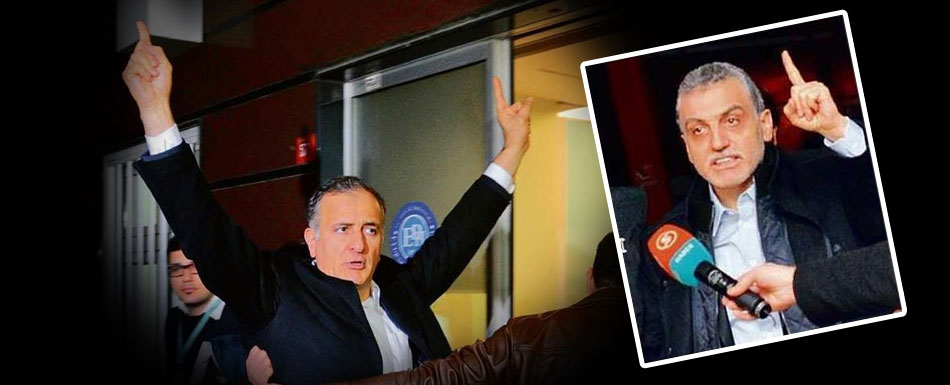Journalists, lawyers see violation of basic rights during lengthy detention

Rights violations during the four-day-long detention and interrogation of Zaman Editor-in-Chief Ekrem Dumanlı and STV network executive Hidayet Karaca at the İstanbul Police Department on Wednesday are reminiscent of coup-time practices.
Dumanlı, Karaca and a number of other journalists, columnists, scriptwriters and producers were arrested on Sunday in a large-scale media crackdown. Some of the detainees were later released following questioning.
The law has been violated in various ways during the detention of the suspects, who were not allowed to know, due to a confidentiality order that was placed on the investigation, what they were accused of until they were questioned.
Media members were taken into custody without solid evidence against them but were detained based on two columns and a report that appeared in the Zaman daily.
The launch of the operation was controversial in the first place because when rumors emerged last week suggesting that Dumanlı and Karaca would be detained in a police operation based on the tweets of a government whistleblower who goes by the name Fuat Avni, Dumanlı and Karaca went to the İstanbul Chief Public Prosecutor's Office on Dec. 12 to ask the chief prosecutor whether there is an investigation under way that concerns them. The prosecutor who checked the National Judicial Network Project (UYAP) told the pair that there was not any investigation against them. Despite this, the they were detained in a police operation two days later.
Sunday's operation came immediately after Parliament passed a law that enabled prosecutors to detain people based on “reasonable suspicion.” The law was approved by President Recep Tayyip Erdoğan at 5:30 p.m. on Friday.
The offices of the Zaman daily were raided by police on Sunday. Dumanlı and Karaca were not invited to the prosecutor's office to testify; instead, they were detained.
Although the interrogation of suspects usually takes place in a courthouse, this was not the case for Karaca and Dumanlı, who were interrogated at the İstanbul Police Department in a manner that was reminiscent of coup times.
Dumanlı and Karaca were not asked a single question in the 80 hours that they were in custody. Although the legal period for their custody expired in the early hours of Thursday, the suspects were still in police custody and had not appeared before a court.
The investigation dossier was made confidential and lawyers of the suspects were prevented from learning about the charges against their clients. The lawyers' request to examine the investigation file was rejected by prosecutors and judges, which came as yet another violation of the law.
Although the lawyers were not allowed to examine the investigation file, the content of the investigation was leaked to pro-government media circles, which launched a series of character assassinations against the suspects regardless of the presumption of innocence.
The journalists' lawyers were given only a 10-square-meter room at the İstanbul Police Department. The room did not even have the basic equipment or furniture such as a table, chairs, a computer, a fax machine, a photocopy machine, a printer, papers, a toilet or water.
The lawyers were made to work surrounded by police officers with guns.
Although interrogation of the journalists was completed at 11:30 p.m. on Wednesday, the lawyers were not informed about the prosecutor's decision concerning the accused. At around 4 a.m. in the morning, prosecutors were said to have left the police department without making any statement. The pair were then taken for a procedural medical examination at 6:15 a.m. in the morning.
Rights violations continued at the İstanbul Courthouse in Çağlayan where the pair were referred for arrest. The journalists' lawyers could not contact their clients. The lawyers could not even learn the whereabouts of their clients and whether or not they had arrived at the courthouse.
The İstanbul Bar Association Lawyers' Rights Monitoring Center noted the rights violations experienced by the journalists' lawyers but did not make any statement on behalf of the lawyers.
Dumanlı's interrogation was conducted by prosecutors İrfan Fidan and Fuzuli Aydoğdu, while Karaca's interrogation was conducted by prosecutor Hasan Yılmaz. The journalists' lawyers were not allowed to speak to the prosecutors.
The questions asked by the prosecutors to the suspects were judged to be strange by many. Some of the suspects who were released following interrogation spoke to the press and said they were asked questions such as “What is a rahle (a small table generally used for reading the Quran)? Do you follow [Turkish-Islamic scholar] Fethullah Gülen's speeches? Do you watch the TV series “Tek Türkiye,” and “Şefkat Tepe?” and “What is Tahşiye?”
It has turned out that the questions directed at Dumanlı during his interrogation simply asked why he performed his duties as a journalist.
For instance, Dumanlı was asked why his paper covered news about July 22 operations against police officers who took part in a graft probe that extended to senior government members, and the news about the government closing down university preparation schools, or dersanes, which interests millions of people in the country. Prosecutors asked the journalist whether he has any family relationship with the police officers detained on July 22. Dumanlı was also asked why a speech of Gülen broadcast on the herkul.org website was covered in the daily.
The prosecutor also asked Dumanlı questions about a column penned by journalist Nuh Gönültaş for the Bugün daily although Dumanlı has no affiliation with the paper.
According to the government-orchestrated investigation, the case is built on charges of defaming a deadly al-Qaeda-affiliated group known as Tahşiyeciler (Annotators).
The prosecutor in charge of the operation claimed that the journalists, through print coverage and broadcast media about the police raids conducted on this group in 2010, had defamed the suspects, including the leader of Tahşiyeciler, Mehmet Doğan. The suspects have been accused of attempting to seize the state. Charges of terrorism and fraud are also part of the investigation.
- Created on .
